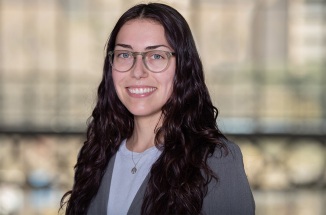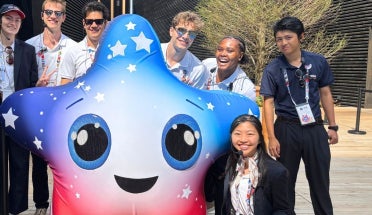
Years of Preparation Take Peace Corps Volunteer to the Philippines
- Mar 2, 2023
- Education Abroad
- by Alex Briseño
Graduate student Danielle Angert still remembers her fascination with the stories told by a former Peace Corps Volunteer who spoke during a visit to her elementary school in New York.
She was 8 years old at the time, but that experience stayed with her through high school and even into her undergraduate studies at Purdue University, where she enrolled in Peace Corps Prep. After studying abroad, completing Spanish courses and building a global community — all key components of the Peace Corps Prep program — Danielle thought she was ready to become a Peace Corps Volunteer.
And then the coronavirus pandemic hit, forcing Angert, who earned her bachelor's in environmental and ecological engineering from Purdue in 2021, to pivot from her dream.
Luckily, an internship in Corpus Christi at an environmental engineering co-op with LyondellBasell, one of the largest plastics, chemicals and refining companies in the world, is what initially connected her with The University of Texas at Austin.
“During that time in Corpus Christi, I made a couple of trips to Austin with some of my other co-workers just for fun, and I loved both the city and the campus,” Angert said.
She added, “When I was applying to graduate schools and thinking more about the research I wanted to do and which faculty I wanted to work with, I found my current advisor, Dr. Mary Jo Kirisits. She had an opening, and it just worked out really well.”
Peace Corps Pursuit
Angert also met with UT Austin’s Peace Corps Recruiter, Maritza De La Peña, who provides on-campus recruiting and advising for current students, staff, faculty and recent alumni. A former Peace Corps Volunteer herself, De La Peña served 2016-2019 as an education volunteer in Ukraine.
“Peace Corps was a life-changing experience for me,” De La Peña said. “It provided me with the opportunity to live in a new country, learn a new language, gain confidence in new skills and make lifelong connections. These are all experiences that I always wanted but was never able to achieve until Peace Corps.”
As a recruiter, De La Peña continued, “I hope to help students who are interested in Peace Corps by showing them the different ways that Peace Corps can impact both the volunteer and communities all around the world, and supporting UT Austin students through the application process.”
Angert describes both De La Peña and Peace Corps Prep, which is also offered at UT Austin, as “invaluable,” specifically citing her appreciation for feedback she received on her resumé, essays and additional application documents.
“Anyone who is remotely considering Peace Corps should definitely look into it and reach out because they are beyond helpful,” Angert said.
With a focus in environmental and water resources engineering, Angert knew she wanted to continue with environmental work. That’s what led her to apply for a community development facilitator and coastal resources management position with Peace Corps in the Philippines.
In October 2022, albeit two years later than originally planned, Angert learned that she landed the position.
“That moment was a little bit overwhelming, to be honest. It's been something I've been thinking about for so long, and now it's finally real,” Angert said. “I almost didn’t believe it at first. Once I had time to process it all, I was just ecstatic.”
Preparing for the Philippines
In 2022, UT Austin was one of the top schools from which Peace Corps received applications from. January 2023 marked the first time Peace Corps Volunteers arrived in the Philippines since evacuating in 2020 due to the pandemic. Angert is set to travel to the Philippines in September, where she will be joined by more than 120 volunteers working alongside community members.
Angert does not yet know her exact placement in the country, but her work will fall into at least one of six designated areas: environmental education, resource assessment and monitoring, participatory integrated coastal management planning, solid waste management, habitat protection and sustainable fisheries.
“A lot of my background is in water quality, so this is a step out of that,” Angert said. “But I did take a coastal engineering course in undergrad, which was super-interesting to me, about modeling waves as they approached the shore — of course, with the subtext of rising sea levels.”
Angert added, “that’s another reason this position interests me. You’re working in an office, but there’s also a requirement that you be able to snorkel, so I’ll definitely be in the water in some way.”
The Philippines is home to more than 7,000 islands and nearly 90 officially recognized languages. During their service, Peace Corps Volunteers learn to speak Tagalog and local languages, including Bikol Naga, Bikol Albay, Cebuano, Hiligaynon, Ilokano, Kinaray-a, Sorsoganon, Tuwali and Waray.
The Peace Corps requires that volunteers live with a host family for at least the first three months of their stay and encourages engagement with the surrounding community, which are both exciting components of the upcoming experience for Angert.
“I really like that Peace Corps overall encourages integration with the community. Typically, you're the only volunteer in your area. In a sense, you're almost forced to really make connections with people. But also, my position being a community development facilitator is something that really excites me, as well,” Angert said.
She added, “As for the country itself, from an environmental perspective, because it’s made up of so many tiny islands, I think it’s a really unique area of the world. I’ve never been to Asia before. I am just really excited to learn as much as I can from the community.”



